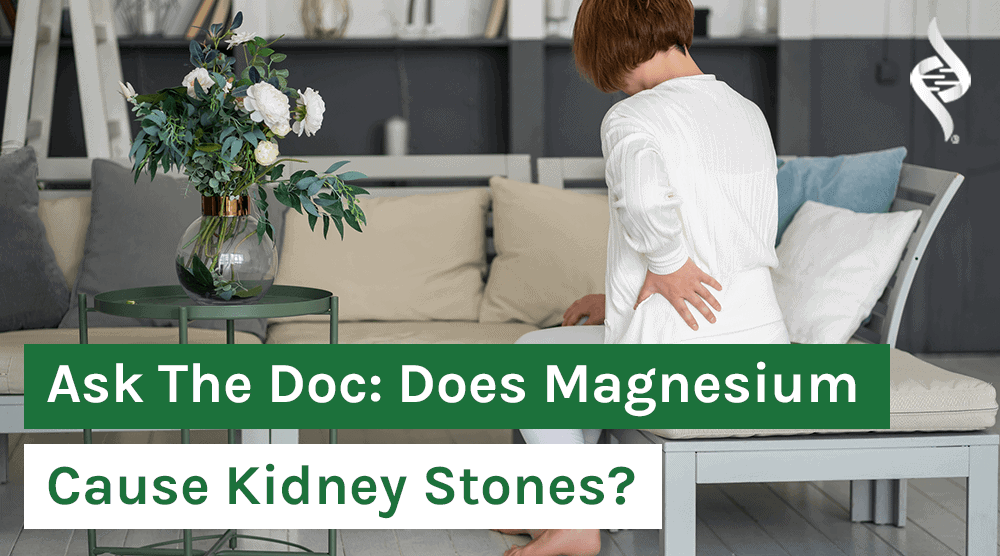Ask The Doc: Does Magnesium Cause Kidney Stones?
Video Transcript:
Our next Ask The Doctor question comes from Gary, and he says, “I’ve read somewhere that too much magnesium can contribute to kidney stones. Since Magnesium 7,” [this product that we sell], “has so much magnesium, I’m reluctant to try it.” It’s actually Gray. Sorry, not Gary. Gray.
Okay. Gray, let me tell you this. Magnesium does not contribute to or cause kidney stones. In fact, the reverse is the truth of magnesium’s power and potency. First of all, our quantity of magnesium in Magnesium 7 is a very diverse assorted form, seven forms of magnesium, which is a really good array of magnesium that targets assorted body systems.
So, just know the Magnesium 7 that we have here at Organixx is very powerful at targeting an assortment of enzymatic reactions within your body that helps optimize your wellness.
Magnesium & Kidney Health
Now, the role that magnesium plays, specifically as it relates to kidney health and kidney stones, magnesium is what we call a calcium blocker. Basically, if you think about your cardiovascular system in your veins and your arteries, when you have optimal ideal ranges of magnesium, usually it’s about 375, 400 milligrams up to about 800 milligrams, depending on the person’s deficiency and their requirements, the output of sweat, etc.
The requirement of magnesium in our vascular system actually serves as a bouncer for free-roaming calcium, and basically you want your calcium to be articulated, reabsorbed, remineralized in your bones, in your teeth. And when we don’t have enough magnesium, you now have a lack of a bouncer, a blocker to calcium.
Calcium & Cardiovascular Health
So, ultimately, what happens is free-roaming calcium without the mechanism of magnesium as a calcium blocker, calcium now can get in to transplant itself in your vascular channel, and we term that disease as arteriosclerosis. We have hardening of our arteries, the calcification of our arteries.
We can see calcifications in all assorted organ and glandular tissue like mammary glands is a very particular example where we see calcifications, and we also see calcifications develop in the kidneys.
Analyze Your Type of Kidney Stones
So, without magnesium, potentially, depending on your body type, you have the likelihood of developing kidney stones, particularly if they are calcium-based kidney stones. There’s complexities there. There are assorted kidney stones, and I recommend getting those tested and analyzed, so then you know. Is it, you need more magnesium or maybe you need to reduce your intake of certain food types?
That I hope clarifies, Gray, your question about magnesium. We don’t have too much magnesium in our Magnesium 7 blend. It’s actually a great diverse assortment of magnesium to help your heart, help your brain, help your gut, help your lymphatic system, and your cardiovascular health.
Test Your Magnesium Levels for Appropriate Dosage
Now, the other thing that I do recommend, if you’re not sure how much to take, you can actually do an elemental test. You can test your magnesium levels, which is really, really critical. What we find is about 98% of all individuals, children and adults, are in a deficient state of magnesium.
Because magnesium is contributed to over 600 enzymatic body reactions [1], it becomes a really critical nutrient, a micronutrient and micro mineral that we need to take in at optimized levels. So, understanding where your level of magnesium is, testing and not guessing, gives you the ability to know what dose is appropriate for you.
Sometimes, for many of my patients, the standard dose that we have… We have two capsules and the total magnesium is 500 milligrams for these two capsules. Sometimes that’s not enough, so in many instances, I might have patients taking two or three doses of magnesium. It all depends on each case. So, test, don’t guess, and, definitely, magnesium does not cause kidney stones.
Thanks for asking your question, Gray, and I look forward to answering more, Ask The Doctor questions. Send us a message down below and I look forward to answering your questions.
Magnesium deficiency is linked to stress, diabetes, heart disease, osteoporosis, chronic fatigue syndrome, depression, anxiety, trouble sleeping, sore muscles, migraines, and many more debilitating health conditions.
If your body needs magnesium, you want the most beneficial kind your body can actually absorb. Organixx Magnesium 7 gives you seven (7) of the very best, most bioavailable types of elemental magnesium available.





Great information on magnesium seven and kidney stones.
currently experiencing a postal strike in Canada. how would you ship to customers here?
Hi Mark, thank you for your question/interest.
We're sorry to hear that you’ve been affected by the Canada Post strike.
Organixx is continuing to fulfill all Canadian-marked orders as they come in, but we will have a hold on the shipping and delivery of the orders until the strike has ended.
Any orders returned to us at Organixx can either be refunded or reshipped once the strike has ended.
Canada Post will resume deliveries once the strike is resolved; however, we have been informed the backlog created by the strike could last weeks after operations resume.
Currently, we do not have a better solution for shipping as we work through the guidelines with Canadian customs.
If you’d like to go ahead and place your order, please know that there will be a delivery delay due to the strike.
If you’d prefer to wait until the Canada Post strike has ended, we would be happy to honor sale prices for you to purchase at that time.
If we can assist with anything else, just let us know.
Wishing you a happy, healthy day!
hi dr melissa
I’m a regular user of mag 7. my question is re black pepper w curcumin. i’ve heard this is detrimental after time. black pepper might assist with absorption but the negative king term effects are undesirable ‼️
Hi Nancy,
Black pepper does help with absorption, however, it can be tough on the gut for some people when used long term. The Organixx Turmeric 3D has fermented ingredients which allows absorption without the need for pepper. Check it out. https://shop.organixx.com/products/turmeric-3d/?ref=nav I hope it suits your needs. Cheers to your good health! :)
Thanks for this great information. I have believed in the importance of Mg & have been taking a quality supplement for many years but I do find if I increase the dose for any reason, say cramps at night, it causes diarrhoea.
Do you have any advice about avoiding the gut reaction & gaining adequate Mg please?
Thanks, Jo
Hi Jo,
Overall, magnesium is considered safe to take, but large amounts can cause GI upset and diarrhea in some people. Also, certain forms of magnesium may cause this effect more than others. Go with your healthcare provider's recommendation on the form of magnesium you should use to avoid this issue and listen to your body. Some people find it beneficial to start with one capsule (250 mg) and work up to 2 capsules (500 mg). Cheers to your good health! :)
How to get rid of arthritis
Hi Maria,
We are sorry to hear of the health challenges you are facing. Sending a healing prayer your way. :) Organixx is unable to provide medical advice, treat , or diagnose any condition. Please read this article that mentions different forms of arthritis. I hope you find it helpful. https://organixx.com/collagen-for-joints-2/ Cheers to your god health! :)